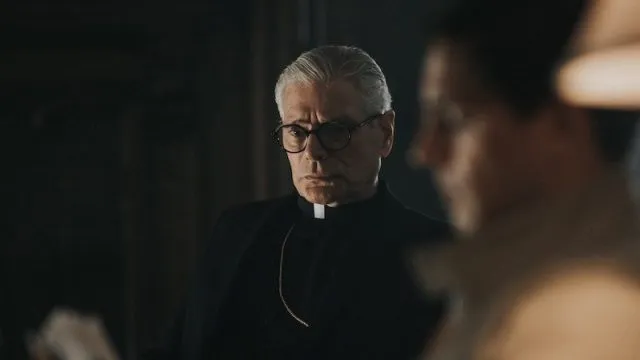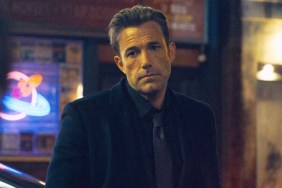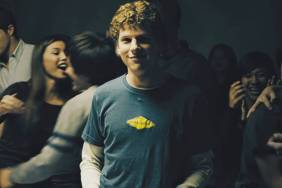Justin P. Lang’s creepy new horror film The Seventh Day opens in select theaters and on VOD this Friday, and ComingSoon.net got the opportunity to speak with one of the film’s stars, Stephen Lang (Avatar), who discussed his role in the film, his acting process and what it was like working alongside Guy Pearce.
RELATED: Guy Pearce Stars as an Exorcist in The Seventh Day Trailer
The Seventh Day stars Guy Pearce, Vadhir Derbez, Stephen Lang and Keith David and tells the tale of a renowned exorcist who teams up with a rookie priest for his first day of training. As it happens, a powerful evil is brewing and the lines between good and evil blur, forcing the two priests to confront their own personal demons.
Justin P. Lang wrote and directed the suspense-thriller.
As a primer for the interview, here’s a clip from The Seventh Day featuring Pearce, Lang and Derbez.
RELATED: Exclusive: Stephen Lang Talks Getting Swole for Avatar Sequels
ComingSoon.net: Congratulations on The Seventh Day. That movie freaked me out.
Stephen Lang: That’s the idea, buddy.
CS: Let’s talk about your character, the Archbishop. he stands as an optimistic, even soothing voice of reason that contrasts with Father Peter’s cynical attitude about faith, what was it that drew you to this character?
Lang: I like the challenge of coming in and, in a relatively brief amount of time, having to create a roll in sharp and efficient and bold strokes that people would immediately kind of get an idea who he was. And he’d be interesting to them, but not really having the span of the film to make the character. So, it was not typical of what I’ve been doing in films, which is, over a duration of time, creating a role. This one was much more … well, I wouldn’t say a sketch because you want it to be complete, but maybe a rapid photograph or something. So that was interesting to me to do that, because I’ve never played this particular kind of character with the sort of polish veneer smoothness in a way that he has this sort of — probably — a feat quality, I think to him, as well. That’s not something that I normally do. So I was interested to come in and do it.
CS: He also seems like he doesn’t quite understand the danger that’s happening. He’s part of an older league that hasn’t quite grasped just how different things have gotten.
Lang: Well, I think you’re right that, in a way, he’s out of touch with evil. I mean, he lives in a fairly insulated kind of position there — his office is kind of a fortress or bunker in a way for him. And I think he has a special relationship with Father Peter. But in a way, it’s one that he doesn’t really completely understand. There’s a part of him that feels eternally benign and forgiving about what he perceives as Father Peter’s rebellious nature, in a way; his sort of subversive nature. But what he doesn’t really understand is, that’s what’s being used on him, that Father Peter’s deal is a lot deeper than that. So, in a sense, yeah, he’s out of his league. That’s not part of his skill set.
CS: Speaking of Father Peter, what was it like acting opposite Guy Pearce? Especially considering you’re each playing completely different characters — one is cynical, the other just out of his league.
Lang: The idea of working with Guy I found very appealing, because I’ve respected his work without knowing him for many years, and I just flat out like the roles that he takes on — he’s a real actor’s actor. So I was pleased to have the opportunity to get a chance to play with him. And we talked enough about [our characters] it seems to me, but we really let the word take care of itself as it were. The caring, the affection, the impatience, it’s all there. It’s all written in the script. And we were able to, over the course of an afternoon to just kind of massage it in various modes.
CS: Did you develop any kind of a backstory for the Archbishop at all in order to help your performance in the scene?
Lang: It’s possible I did. And I probably did. But I actually can’t recall right now. [Laughs] It’s kind of an unfortunate admission to make. But the brief seemed pretty clear. I think I probably did relate him to certain locations, to things like restaurants to, you know, certain odors and everything. I I kind of created something that was complete enough for my own purposes, my own work.
The truth is I’ve created backstories up the wazoo for characters; and the reason that you do that is for your own … creating your own sense of authenticity, and grounding, in the role. Correct? But I’ll tell you something, that stuff can be very esoteric, very ephemeral and can disappear, you know, gone with the wind. You create it when you need it, and then it’s gone. There’s certain characters that remain indelible. The work that you have to do on them is so intense, and so ongoing, that you can speak with more authority about what the backstory is what it was. In terms of the Archbishop, however, I mean, I can only go to the experiences I’ve had, which really has to do with what I perceive to be like the Archbishop’s residence in New York City. I remember my mother telling me she had been invited to have — because she did good works — and she was invited to have tea with the Archbishop. You know, and she did and I remember hearing her description of the interior. For me, it’s a very alien world. It’s not something I’m part of. So I kind of made it up.
The work that you do as an actor, it’s a product of years and years of observation and stuff you’re not even aware of. So it’s what I say when I’m talking about the residents on Fifth Avenue, which I’ve never been inside, but I imagine it. I’ve wondered about it for many, many, many years. It must be very wealthy, very rich, very cool inside there in some way. That’s the kind of stuff that plays when you’re creating a role, just impressions and ideas. It doesn’t matter whether they’re even facts, whether they’re true. It can be stuff that you kind of believe or imagined to be true; and they become part of the performance, and they feel authentic.
CS: Is it weird for me to ask where you stand in terms of demons and the type of evil depicted in the film — since we’re talking about a film that deals with the supernatural? Do you believe in this stuff or is it all Hollywood fiction?
Lang: I don’t think it’s all Hollywood fiction. If what you’re asking is, does evil exist, which is maybe a different question or variation on it, I believe, absolutely it does. And I think it manifests itself in all kinds of terrifying ways. Some of them are uncanny. Some of them are just sort of mundanely dreadful, it seems to me. Now when it comes to do I believe in demons? Yeah, I do. I mean, whether they have names like Beelzebub and everything … that? I’m not convinced of that. But I do know that there’s manifestly bad evil in the world. Are they demonic? You’re fucking right they are. Absolutely, and it takes righteousness to stamp that out.
CS: Any film that deals with exorcisms will always get compared to The Exorcist. How would you say The Seventh Day is different or similar to that classic film?
Lang: Well, I think that I would be reluctant to compare any film to The Exorcist, because The Exorcist is not only the greatest film of its genre, it’s just flat out one of the great American films. It’s certainly on my top 20 list. It’s a remarkable film, and I’m not sure where it would be in that list. But that’s, you know, rare company. You always want to aspire, but I wouldn’t presume that you’re ever going to out exorcist The Exorcist. But having said that, what that movie did do, aside from creating a benchmark, it states its theme — it very, very clearly explicitly states its story, its aim, or the destruction of this fight over a girl’s soul. And in any other exorcist film that always exists in relation to it. So, what’s going on with the priest in this film, it’s an interesting variation. It’s a really interesting take on it, it seems to me, and all the more interesting for standing in counterpoint to the thought of Kara’s character in The Exorcist. There’s no equivalent, obviously, between Father Peter and anybody else, but there are elements of the Father Karras, certainly.
CS: I know we can’t get too much into spoilers, but The Seventh Day is left open ended for a possible sequel. Has there been any talk about doing a follow up?
Lang: I haven’t heard any, no. Who knows? I love sequels!










